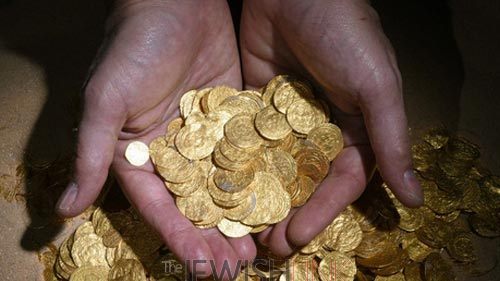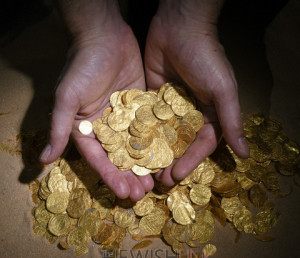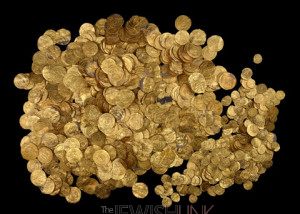
1,000 Year Old Gold Treasure Found by Divers in Caesarea
The largest hoard of gold coins ever discovered in Israel was found in recent weeks on the seabed in the ancient port of Caesarea. The treasure was discovered by a group of divers which reported their findings to Israel’s Antiquities Authority.
Tazpit News Agency spoke to Zvika Fayer, one of the divers which participated in the discovering of the gold coins. “We went diving on February 7, as we do almost every Saturday. We were diving 12, maybe 12.5 meters under sea surface. I saw a flickering on the bottom of the Mediterranean, so I swam there and started digging with my bare hands. Other members of my diving group joined me and we discovered a significant amount of coins. After the dive was over we contacted the Israel Antiquities Authority and notified them about our discovery,” Fayer told Tazpit News.
Fayer and his diving group went back into the Mediterranean alongside a diving crew from the Marine Archeology Unit of the Israel Antiquities Authority. “We led the divers from the Antiquities Authority to the location of the gold treasure, we were very pleased to assist them,” Fayer told Tazpit.
Tazpit News Agency spoke to Dr. Robert Kool, an expert numismatic from the Israeli Antiquities Authority, about the historical background that lead such a treasure to the cost of Caesarea. “The coins date back to the Fatimid Caliphate which conquered Israel near the end of the 10th century AD. The Fatimids controlled a vast empire, from Morocco in the west, to Iraq in the east. They controlled trade routes all over the Mediterranean, bringing gold from West Africa to Europe and the Middle East. Gold was extremely important in the 10th and 11th centuries, because it was the currency of the Fatinid’s monetary system,” Dr. Kool told Tazpit News Agency.
Dr. Kool states that the treasure is “the largest I’ve seen found in an Israeli archeological excavation. Nevertheless, I don’t think it is of exceptional size considering the Fatimid’s trade system. We assume the treasure arrived from Egypt, and was part of a payment for trade services,” Dr. Kool told Tazpit News.
The treasure contains approximately 2,000 gold coins of different denominations: a dinar, half dinar and quarter dinar. They are of various dimensions and weight. The earliest coin discovered in the treasure is a quarter dinar, minted in Palermo, Sicily, which was part of the Fatimid Caliphate.
Dr. Kool points out an entertaining fact, “some of the coins have teeth marks on them. Apparently, that was a common way to check the true value of coins, in the heyday of the Fatimid Caliphate.”
By Yotam Rozenwald
Tazpit News Agency

Photo 1&2: The coins found in underwater.

Photo 1&2: The coins found in underwater.